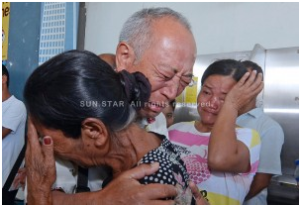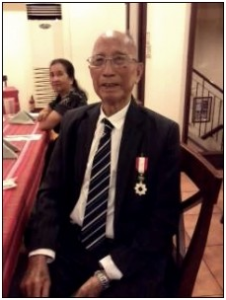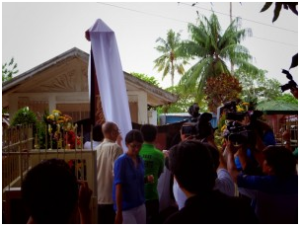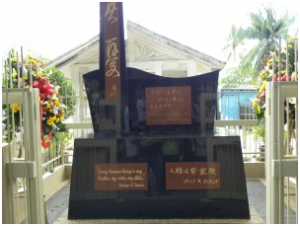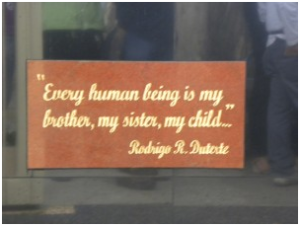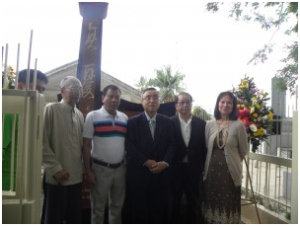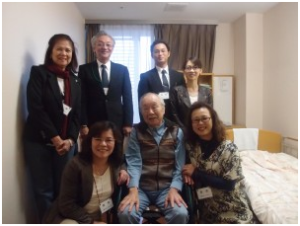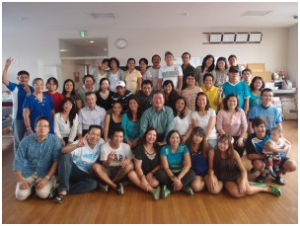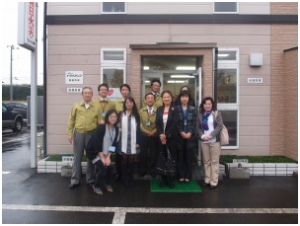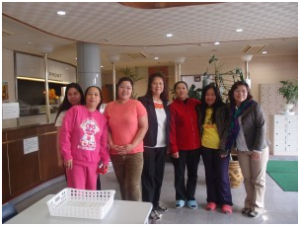After a lifetime By: Arianne Caryl N. Casas Saturday, May 17, 2014 Sun.Star Davao
SHE was only four years old when their Japanese father left as World War II intensified. That was the last she saw her father.
Filipino-Japanese descendant Conchita (Japanese name Takiko) Miyazato-Basilan is now 73 years old and lives with her grandchildren in her half-hectare lot in Barangay Cogon, Biao in Digos, Davao del Sur.
Born on June 16, 1940, Conchita is the only surviving offspring of the late Antonia Payan, of the Kalagan tribe, and Genichi Miyazato, who came to work as a cook in the Japanese military camp in Sasa, Davao City.
Davao City was home to around 20,000 Japanese before World War II broke out, working in abaca plantations and tending to different businesses here. The Japanese Practically owned the businesses along the major streets of Davao City and in Toril and Calinan, such that it was commonly referred to as Davao-ku, or a district of Japan.
Genichi arrived in the Philippines in 1929 and was engaged in abaca farming in Digos. He got acquainted with Filipina Antonia and they eventually got married. Because their wedding was held following the Kalagan tribal ceremony, there is no record of marriage and the date of their marriage is unknown.
Conchita is the only daughter of the couple, the rest were boys namely Francisco (Ichiro), Pedro (Ginijiro), and Romeo (Kinichi). Their mother taught them to live a simple life with dignity and respect for others.
When war broke out, Genichi moved to Calinan in Davao City with other Japanese and Filipinos who were on the side of Japan for his own safety.
(Davao- Conchita Miyazato-Basilan and her Japanese kin shed tears after seeing each other for the first time. King Rodriguez)
Meanwhile, Antonia and the children took refuge in the woods of Malita. Later on, they were notified that Genichi died in Calinan due to malaria.
After the war, Antonia supported the four children by herself. Conchita, as a child, helped her mother to earn a living.
There wasn’t enough money for school. She married at the age of 13 and had 12 children—Arturo, Alberto (deceased), Orlando, Oscar, Tommy (deceased), Diosdado, Rico, Jesus, Nenito (deceased), Jenny Rose, Jessie, and Archie.
Now widowed, she lives with them and her 29 grandchildren and 14 grand grandchildren in Digos City.
In 1995, Conchita participated in the survey on second generation Japanese descendants held by Ministry of Foreign Affairs of Japan, with hope of finding the identity of her father.
Her youngest son, Archie, helped her in tracing the roots of their father in Japan.
“I was a college student then. I almost lost hope because we had no documents on hand. The only proof we had was the family picture with our grandfather. We were told to keep it but my uncle misplaced it. We thought it would be hopeless,” Archie said in the vernacular.
Conchita was determined to find her father’s relatives although the cumbersome job of doing so snipped her high hopes.
“We were challenged. It was really very hard. We had to travel from Digos to Davao City and transact with people we trusted so much. But, circumstances delayed the chance of seeing them. I later lost hope, so I told myself sending them prayers would be enough,” Conchita said.
Archie reprocessed the papers in 2000, but to no avail. He again worked for it in 2006, still with a negative result.
Thirteen years later, the Philippine Nikkei-Jin Legal Support Center (PNLSC), who helps Japanese descendants to trace their roots and recover their Japanese nationality, found her father’s family registry in Japan as a result of research.
“We were happy. We were excited to hear the news,” Archie said. For Conchita, learning that the Japanese family was already traced was enough for her.
Until the organization told her that the Japanese family wanted to meet her in person and visit the grave of Genichi.
From Okinawa
Genichi was married and had four children in his hometown in Okinawa, Japan, before coming to the Philippines. His Japanese wife and the children (all of them are now deceased) knew that Genichi had another family in the Philippines.
In December 2013, one of his grandsons from Japan side called the office of PNLSC in Tokyo. Learning through a newspaper article that the organization was helping the children of pre-war Japanese immigrants in the Philippines, he asked for help in finding his grandfather’s grave and his children with a Filipina wife. As PNLSC heard the details from Tsuyoshi Miyazato, 55, the grandson in Okinawa, it became clear that he was a relative of Conchita.
According to Tsuyoshi, the children of Genichi had hard feelings toward him but seemed not to be able to completely forget him either. This time, Tsuyoshi and three of Genichi’s grandchildren, namely Shigeru Taira, 67, Hiroshi Miyazato, 64, and KatsukoMinei, 60, wanted to meet their aunt and visit the place where their grandfather rests.
The Reunion
Conchita traveled from Digos City to Davao City early morning of May 16, riding on a Lawin (a public utility jeepney that can carry more than 20 passengers). She was with her children and grandchildren.
Wearing a dark colored blouse, light pants and a pair of doll shoes, Conchita appeared excited to see Japanese nephews and niece. She had hair dye stain on her scalp.
“My grandchildren colored my hair black. They told me I had lots of white hairs. They cautioned me that our Japanese relatives might not recognize me because I look very old,” Conchita said.
Conchita’s voice was raspy. She said she suffered from a heart attack years ago and that affected her voice. “I am old and sick. And that’s the reason why I stopped believing that I could still see them,” she said.
It was a sunny Friday at the Francisco Bangoy International Airport during the reunion of the Miyazato family.
Tsuyoshi, Shigeru, Hiroshi and Katsuko, all from Okinawa, Japan, arrived noon of May 16. They were accompanied by representatives from Nippon Foundation and Japanese media.
Their reunion was the first time that a homecoming was held in the Philippines. Reunions in the past were in Japan.
With their bags in tow excitement and happiness were drawn on the faces of the four Japanese relatives of Conchita.
Conchita, meanwhile, positioned herself at the arrival area, carrying a tarpaulin with a welcome message.
It was Shigeru who first identified Conchita and moved towards her. He hugged her aunt so tight for the very first time. They were both crying so hard.
Tsuyoshi, Hiroshi and Katsukocame near and hugged Conchita. They were also crying.
“My sister’s hair was white. But yours is black. You colored your hair?” Shigeru jested. The conversation between the relatives was translated by Rika Taniguchi of Hello World Tour in Philippine Nikkei-Jin Kai Inc.
Shigeru said they know about the second family of her grandfather since they were young, but their grandmother, Genichi’s Japanese wife, refused to look for them. Until such time, they already decided for themselves to pursue what they want—to meet the second family of Genichi.
Tsuyoshi, meanwhile, asked for forgiveness from her aunt. He said he was hesitant at first to look for his aunt due to some security issues in the Philippines years ago.
“I feel sorry for my aunt Conchita. It took us a very long time to see her,” Tsuyoshi said.
“We come here for two reasons. First is to offer a prayer to the soul of our grandfather Genichi. Second is to meet our relatives here, especially the children of our grandfather,” he said.
Shigeru said they are yet to discuss with Miyazato-Basilan any plans to meet with their relatives in Japan.
“We have not decided yet. But we will help them. We will send something from Japan to the family of our aunt. Something that they need. It’s about time that we have to take care of her,” Shigeru said.
“In my own opinion, I would want to bring Conchita to Japan but it is something that we, cousins, need to discuss yet,” he said.
Conchita, on the other hand, said she is very grateful for the efforts of her nephews and niece to look for her.
“I am already old. I live peacefully with my grandchildren. I never expected this would still happen. Thank you,” Conchita said in the vernacular.
If given a chance, she said she is willing to go to Japan with the grandchildren of her father.
Although she had only few words to tell them due to language barrier, the happiness and satisfaction are visible on her eyes.
The Japanese family thanked the Nippon Foundation and the PNLSC for helping them locate their aunt.
After their emotional meet-up at the airport, the family proceeded to Nanay Bebeng Restaurant and had lunch together. In the afternoon, they went to Tamugan Cemetery and visit the grave of Genichi.
The Japanese relatives yesterday visited Conchita in her abode in Digos City and the place where Genichi lived before as part of their six-day visit.
Retired Judge Antonina Oshita Escovilla, president of the Philippine Nikkei-Jin Kai Inc., said the visit of the grandchildren of Genichi to Conchita marks the first time that a homecoming/reunion was held in the Philippines.
She said a Japan-Philippines nongovernment organization (NGO) sponsors Filipino-Japanese descendants to go to Japan and meet their relatives there, but this year, it will be the Japanese relatives who will come to the Philippines to personally be with the descendants.
“She’s really very lucky. They tried everything to look for her. So, this is going to be a reunion,” Escovilla said.
The reunion of the two families is a testament of love. Although Conchita belongs to the second family of her Japanese father, her relatives from the first family looked for her to say thank you and sorry for all.
As what the Corinthians teach us, “Love is patient, love is kind. It does not envy, it does not boast, it is not proud. It does not dishonor others, it is not self-seeking,
it is not easily angered, it keeps no record of wrongs. Love does not delight in evil but rejoices with the truth. It always protects, always trusts, always hopes, always perseveres.”

